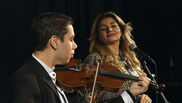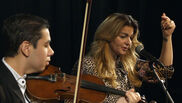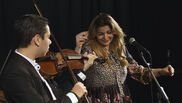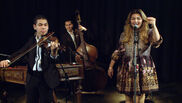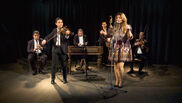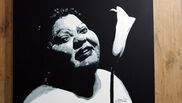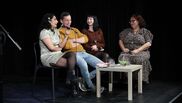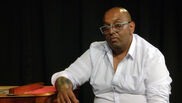Azt a kutya mindenit (Throw It to a Dog) - Gitana and Ďusi Band
created: 13. 06. 2022 13:04 modified: 06. 10. 2022 15:34
The Hungarian folk song Azt a kutya mindenit (Throw It to a Dog), performed by the singer Gitana (stage name), her civil name is Adriana Drafiová, musical accompaniment by Ďusi Band, the folk cimbalom orchestra. The swing song’s is interpreted in the way typical for sub-genre gypsy swing. The video was recorded on November 19, 2021 in Prešov, The Center for Independent Culture Wave. Gitana (A. Drafiová) - vocals, Július Bandy - dulcimer, Samuel Bandy - violin, Roland Horváth - clarinet, saxophone, Kristián Bandy - viola, Július Bandy junior - double bass.
Gitana
Musical talent is her family heirloom. Gitana (Adriana Drafiová) used her gift and became an accomplished singer of mainly electro swing and gypsy swing. Already at the age of seventeen, she sang with various bands abroad, performed in Hungary with Jozef Szabo, a respected singer, and later on her years long collaboration with the Kmeťoband began. She also sang a duet with Juraj Benetin, the lead singer of Korben Dallas, which is the opening song of Pixar's animated short film Lava from 2015.
Ďusi Band
Romani family folk band from Prešov, led by the cimbalist Július Bandy. He and his three sons produce and preserve the best traditions of Romani dulcimer music in Slovakia. They perform independently or in collaboration with a wide range of Roma and non-Roma artists. The guest member is Roland Horváth (clarinet, saxophone) from Rimavská Sobota.
category: music
tags: vocal-instrumental modern folk quintet Hungarian Ďusi Band Gitana Adriana Drafiová general audience internal
Nane cocha, nane gad (I Don’t Have a Skirt nor Shirt) - Gitana and Ďusi Band
created: 13. 06. 2022 13:02 modified: 06. 10. 2022 15:26
Soviet film Gypsies Go to Heaven (1975). The beat is 2/4, the song starts slowly, the tempo accelerates and intensity increases with each repetition. The video was recorded on November 19, 2021 in Prešov, The Center for Independent Culture Wave. Gitana (A. Drafiová) - vocals, Július Bandy - dulcimer, Samuel Bandy - violin, Roland Horváth - clarinet, saxophone, Kristián Bandy - viola, Július Bandy junior - double bass.
Gitana
Musical talent is her family heirloom. Gitana (Adriana Drafiová) used her gift and became an accomplished singer of mainly electro swing and gypsy swing. Already at the age of seventeen, she sang with various bands abroad, performed in Hungary with Jozef Szabo, a respected singer, and later on her years long collaboration with the Kmeťoband began. She also sang a duet with Juraj Benetin, the lead singer of Korben Dallas, which is the opening song of Pixar's animated short film Lava from 2015.
Ďusi Band
Romani family folk band from Prešov, led by the cimbalist Július Bandy. He and his three sons produce and preserve the best traditions of Romani dulcimer music in Slovakia. They perform independently or in collaboration with a wide range of Roma and non-Roma artists. The guest member is Roland Horváth (clarinet, saxophone) from Rimavská Sobota.
category: music
tags: vocal-instrumental modern folk quintet Slovak Romani Ďusi Band Gitana Adriana Drafiová general audience internal
Gelem, gelem (We Went, We Went) - Gitana and Ďusi Band
created: 13. 06. 2022 12:55 modified: 06. 10. 2022 15:17
Local version of the official Roma anthem Gelem, gelem performed by the singer Gitana (stage name), her civil name is Adriana Drafiová, musical accompaniment by Ďusi Band, the folk cimbalom orchestra. The video was recorded on November 19, 2021 in Prešov, The Center for Independent Culture Wave. Gitana (A. Drafiová) – vocals, Július Bandy – dulcimer, Samuel Bandy – violin, Roland Horváth – clarinet, saxophone, Kristián Bandy – viola, Július Bandy junior – double bass.
Gitana
Musical talent is her family heirloom. Gitana (Adriana Drafiová) used her gift and became an accomplished singer of mainly electro swing and gypsy swing. Already at the age of seventeen, she sang with various bands abroad, performed in Hungary with Jozef Szabo, a respected singer, and later on her years long collaboration with the Kmeťoband began. She also sang a duet with Juraj Benetin, the lead singer of Korben Dallas, which is the opening song of Pixar's animated short film Lava from 2015.
Ďusi Band
Romani family folk band from Prešov, led by the cimbalist Július Bandy. He and his three sons produce and preserve the best traditions of Romani dulcimer music in Slovakia. They perform independently or in collaboration with a wide range of Roma and non-Roma artists. The guest member is Roland Horváth (clarinet, saxophone) from Rimavská Sobota.
category: music
tags: vocal-instrumental modern borrowed quintet Slovak Romani Ďusi Band Gitana Adriana Drafiová general audience internal
Úgy szeretem (I love It That Way) - Gitana and Ďusi Band
created: 13. 06. 2022 12:27 modified: 06. 10. 2022 10:04
The folk-like song performed by the singer Gitana (stage name), her civil name is Adriana Drafiová, musical accompaniment by Ďusi Band, the folk cimbalom orchestra. In Slovakia it is known under the title We Thought It Was Raining. The song’s tempo is fast, for dancing. The video was recorded on November 19, 2021 in Prešov, The Center for Independent Culture Wave. Gitana (A. Drafiová) - vocals, Július Bandy - dulcimer, Samuel Bandy - violin, Roland Horváth - clarinet, saxophone, Kristián Bandy - viola, Július Bandy junior - double bass.
Gitana
Musical talent is her family heirloom. Gitana (Adriana Drafiová) used her gift and became an accomplished singer of mainly electro swing and gypsy swing. Already at the age of seventeen, she sang with various bands abroad, performed in Hungary with Jozef Szabo, a respected singer, and later on her years long collaboration with the Kmeťoband began. She also sang a duet with Juraj Benetin, the lead singer of Korben Dallas, which is the opening song of Pixar's animated short film Lava from 2015.
Ďusi Band
Romani family folk band from Prešov, led by the cimbalist Július Bandy. He and his three sons produce and preserve the best traditions of Romani dulcimer music in Slovakia. They perform independently or in collaboration with a wide range of Roma and non-Roma artists. The guest member is Roland Horváth (clarinet, saxophone) from Rimavská Sobota.
category: music
tags: vocal-instrumental modern folk quintet Hungarian Slovak Ďusi Band Gitana Adriana Drafiová general audience internal
Giving the Bride Away - Gitana and Ďusi Band
created: 13. 06. 2022 10:45 modified: 06. 10. 2022 09:05
The folk song performed by the singer Gitana (stage name), her civil name is Adriana Drafiová, musical accompaniment by Ďusi Band, the folk cimbalom orchestra. Depending on the region, the song is performed in various rhythmic variations, sometimes titled as The Gypsy Bride’s Wedding. The song’s tempo is fast, for dancing. The video was recorded on November 19, 2021 in Prešov, The Center for Independent Culture Wave. Gitana (A. Drafiová) - vocals, Július Bandy - dulcimer, Samuel Bandy - violin, Roland Horváth - clarinet, saxophone, Kristián Bandy - viola, Július Bandy junior - double bass.
Gitana
Musical talent is her family heirloom. Gitana (Adriana Drafiová) used her gift and became an accomplished singer of mainly electro swing and gypsy swing. Already at the age of seventeen, she sang with various bands abroad, performed in Hungary with Jozef Szabo, a respected singer, and later on her years long collaboration with the Kmeťoband began. She also sang a duet with Juraj Benetin, the lead singer of Korben Dallas, which is the opening song of Pixar's animated short film Lava from 2015.
Ďusi Band
Romani family folk band from Prešov, led by the cimbalist Július Bandy. He and his three sons produce and preserve the best traditions of Romani dulcimer music in Slovakia. They perform independently or in collaboration with a wide range of Roma and non-Roma artists. The guest member is Roland Horváth (clarinet, saxophone) from Rimavská Sobota.
category: music
tags: vocal-instrumental modern folk quintet Slovak Ďusi Band Gitana Adriana Drafiová general audience internal
Jozef Fečo - Věra Bílá
created: 07. 06. 2022 14:12 modified: 07. 06. 2022 14:14
The process of painting the portrait is recorded on the video. The person on the portrait is the Romani singer Věra Bílá (1954-2019). The paintings were made during implementation of the project Unknown Colours of Personalities, through which a total of 23 large-format portraits of Romani personalities were created. The first series of 13 paintings was created in 2015, the second series of 10 paintings was created in 2020. The author of the paintings is the Romani artist Jozef Fečo.
Věra Bílá. She was born on May 22, 1954, Rokycany, Czech Republic. She was a singer, musician and actress. She came from the well-known musical family of Karol Giňa. Her unique voice color and specific vocal expression have secured her a permanent place on the music scene at home and abroad. In 1995, together with young musicians, created the musical phenomenon of Věra Bílá and Kale. Musically, they defined a genre known as rom-pop: sophisticated vocal harmonies with vigorous dissonances in a mixture of Romani folk music, pop and Latin jazz. Věra Bílá also acted in two films by director Dušan Hanák: Ružové sny/Pink Dreams (1976), Ja milujem, ty miluješ/I Love, You Love (1980). She died on March 12, 1954, Pilsen, Czech RepublicMusic experts often likened Věra Bílá to the American Black star Elle Fitzgerald. She died on March 12, 2019 in Pilsen, Czech Republic.
Jozef Fečo is a graduate of the Secondary Art School in Prešov, Department of Design and Artistic Wood Shaping. He is mainly interested in the facial expressions of human faces, their expressive value and typical personality traits.
category: fine arts
tags: secular material artistic 2D artifact painting Slovak Jozef Fečo general audience internal
Jozef Fečo - Katarína Taikon
created: 07. 06. 2022 12:51 modified: 07. 06. 2022 13:02
The video captures the work of art. The person shown is the Roma singer Věra Bílá (1954-2019). The creation of the image is realized within the framework of Unknown Colors of Personalities, through which a total of 23 large-format portraits of Roma personalities were created. The author of the portraits is the Romani painter Jozef Fečo.
Katarina Taikon-Langhammer She was born on July 29, 1932, Almby, Sweden. She was a Swedish Roma activist, leader of the civil rights movement, writer and actress, from the Roma group Kalderash. The sister of the jeweler Rosa Taikon. Through her political and media activity, she fought for the acquisition of civil rights for the Roma in Sweden. She managed to change the main stereotypical views of the major society through her literary work; between the years 1963 and 1980 she published 16 sequels of children's books about the Roma girl Katitzi. Her stories are still very popular, even films were made of them. Katarina Taikon, for her political activism, is often compared to Martin Luther King. She died on 30 December 1995, Ytterhogdal, Sweden.
Jozef Fečo is a graduate of the Secondary Art School in Prešov, Department of Design and Artistic Wood Shaping. He is mainly interested in the facial expressions of human faces, their expressive value and typical personality traits.
category: fine arts
tags: secular material artistic 2D artifact painting Slovak Jozef Fečo general audience internal
Live Book: Red Tomato
created: 18. 05. 2022 09:03 modified: 18. 05. 2022 09:21
The film Loli Paradička is a romantic comedy about the love of Veronca and the goods seller at fair, Milan. They both are disabled in their way - Milan has no leg, Veronka is a Romani girl. It does not prevent them from living through their sincere, ridiculously sad story, full of hope, love and humor. Screenplay and direction: Richard Staviarsky, Viťo Staviarsky. Music: Štefan Cína and Viťo Staviarsky. The main roles were played by Michal Iľkanin and Kamila Mitrášová. It won the Audience Award at the Art Film Fest festival, and in 2019 it was the most successful Slovak film. The guests of the event within the series of events called the Living Books, implemented by the State Scientific Library in Prešov, were the creators Richard Staviarsky and Marka Staviarska (the producer) and the actress who played the main character, Kamila Mitrášová. The musical guest was the Folk Music Band of Štefan Cína. Štefan Cína is the co-author of the music soundtrack to the film, the band recorded most of the original songs.
category: speaking
tags: retrospective factual dialogue guided Slovak Richard Staviarsky Marka Staviarska Kamila Mirtrášová general audience internal
Štefan Bučko
created: 18. 05. 2022 09:00 modified: 22. 03. 2023 14:56
Štefan Bučko comes from Banská Bystrica. He is a member of the folk music group of Alexander Daško, where he plays the accordion. For more than twenty years he played and sang in well-known music halls in Slovakia. He put his music career aside and began working as a bus driver. Now he perceives music more as a hobby, playing and singing sporadically. In the interview, he talks about his views about music, his family and Romani folklore.
category: speaking
tags: retrospective biographical monologue guided Slovak Štefan Bučko general audience internal
Romano hangos – kompletný archív vydaní v roku 2021
created: 05. 05. 2022 13:32 modified: 11. 11. 2024 16:20
Časopis Romano hangos (Rómsky hlas) je dvojtýždenník vydávaný Spoločenstvom Rómov na Morave. Noviny vychádzajú v tlačenej a elektronickej verzii. Zakladateľom novín je významná česká osobnosť Ing. Karel Holomek (1937). V rokoch 1990-1992 bol poslancom Českej národnej rady. Noviny vychádzajú v Českej republike od roku 2000. Obsah novín je v češtine a rómčine.
Kompletný archív vydaní novín v roku 2021 (ročník 23) tvoria čísla 1-19.
číslo 1
ďalšie čísla: č.2, č.3, č.4, č.5. č.6, č.7, č.8-9, č.10, č.11, č.12, č.13, č.14, č.15, č.16, č.17, č.18-19
category: literature




